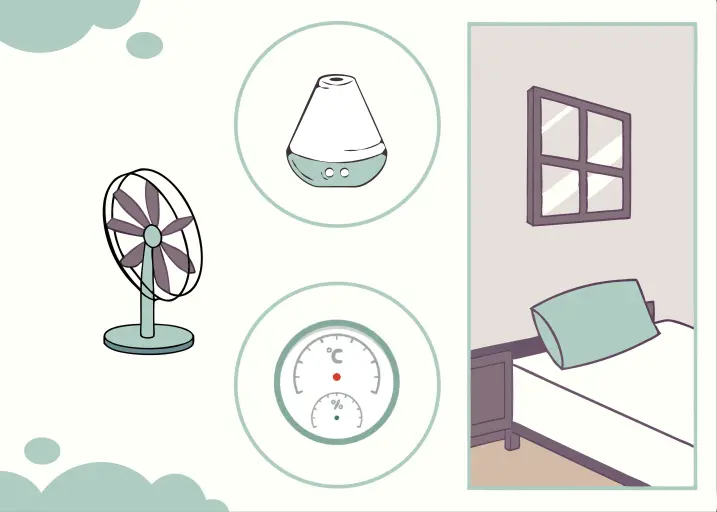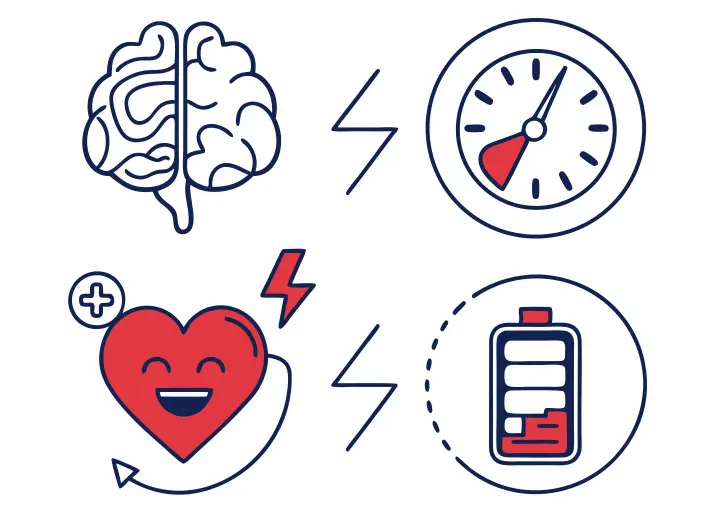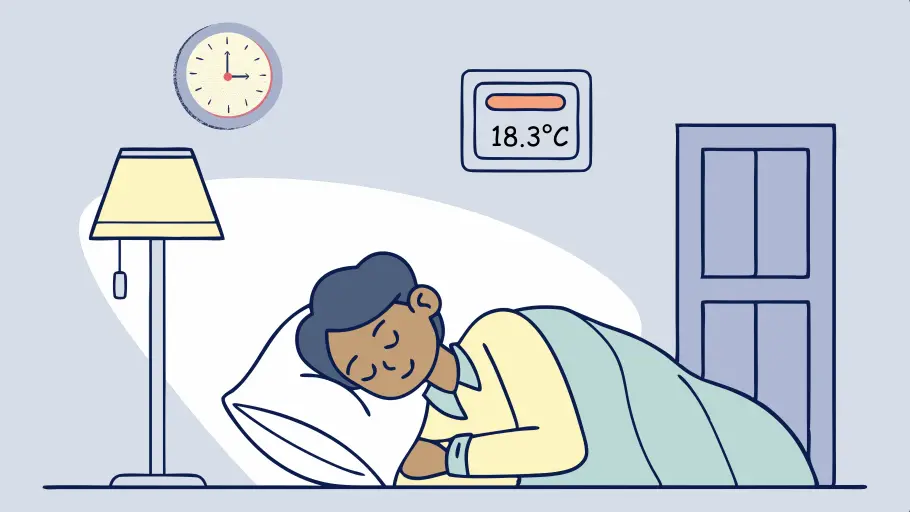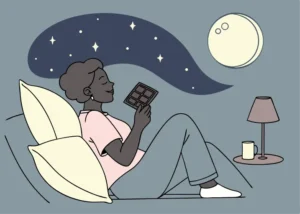I thought being tired all the time was normal because I was always busy. I had to meet deadlines, go to meetings, and get as little sleep as possible.
But after many months of feeling tired at work, I found out my bedroom was the problem.
The solution wasn’t an expensive mattress or dark curtains. It was something easy: making sure the temperature and humidity were right. Now I wake up feeling good, and it only took me 15 minutes to fix.
If you’re seeking health optimal sleep without overhauling your entire life, this is your shortcut.
Why Your Sleep Environment Matters for Seeking Health Through Sleep
Your bedroom is more than just a place to sleep. It’s where your body fixes itself while you sleep, but only if things are right.
Here’s how it works: Your body cools down when you’re ready to sleep. If your room is too warm, your body has to work harder, instead of resting.
Studies show that even a little bit of warmth can make it harder to sleep well.
It’s like a laptop that’s getting too hot – it won’t work well until you cool it down.
The Magic Number: Why Optimal Temperature for Sleeping in Celsius Matters
I tried different temperatures for weeks. I found the best temperature for sleep, which sleep experts suggest: 18.3°C. It’s good to be between 15.6°C and 19.4°C.
This optimal temperature for sleeping celsius isn’t random,it’s the perfect temperature for your body to cool down naturally.
Too warm: You’ll move around a lot because your body is trying to cool off.
Too cold: our muscles will tighten, and you won’t sleep deeply.
Just right: Your body can relax and focus on fixing itself instead of controlling its temperature.
I set the temperature to 18.3°C, and I saw these changes:
- I fell asleep quicker (I didn’t stay awake looking at my phone)
- I woke up less in the middle of the night
- I felt awake and ready to go, instead of hitting the snooze button many times

Optimal Humidity for Sleeping: The Factor Nobody Talks About
People always talk about temperature, but humidity is just as important. The best humidity for sleeping is between 40% and 60%.
I found this out the hard way in the winter. My apartment was warm, but it felt very dry. The dry air made me wake up with a sore throat. It felt like I had been breathing through my mouth all night.
If the humidity is less than 40%: Your airways might get irritated. You might snore. Your skin might get dry.
When the air is more than 60% humid: You feel sticky, your body can’t control its temperature well, and dust mites thrive.
If there’s not enough moisture in the air, you’ll be uncomfortable. Too much moisture is a good place for things that cause allergies to grow.
Why Both Temperature and Humidity Support Seeking Health Optimal Sleep
If you only focus on one and ignore the other, it’s like having a nice car with flat tires.
Temperature and humidity help you sleep, especially during deep sleep and REM sleep. This is when your brain and body recover.
When I got the temperature and humidity right, things changed. I wasn’t tired in the afternoon anymore, and I didn’t need energy boosts to get through the day.
Controlling your environment affects how your brain goes through different sleep stages during the night.
Your 15-Minute Setup for Optimal Sleep Conditions
Here’s what I did:
Temperature Control
- Before you go to bed, set your thermostat to 18-19°C.
- If you don’t have air conditioning, use a small fan. Point it away from you.
- If it’s cold outside, open the window a little bit.
Humidity Management
- Get a cheap hygrometer (you can find them online for less than £10) to check the humidity level.
- If it’s too dry (less than 40%): Use a small humidifier or put a bowl of water near your bed.
- When it’s too humid (over 60%): Use a dehumidifier, air conditioner, or open windows for better airflow.
Easy Things to Try
- Make your room cooler 30 minutes before you go to sleep.
- Use sheets that let air through and don’t trap moisture.
- Put your hygrometer somewhere away from where heat comes out.

The Health Benefits of Seeking Health Optimal Sleep Through Environment Control
You’ll feel better quickly. After I made my room better for sleep within a week:
Better Physical Recovery: I stopped waking up stuffed up or with dry skin. My body could fix itself while I slept instead of dealing with problems in the room.
Mental Clarity:That fuzzy feeling, like you need a lot of coffee, went away. When you sleep well, your brain gets a good cleaning.
Sustained Energy:I stopped feeling super tired and worn out, which made me think about why I had low energy or made me want energy drinks.
Better Mood: You’ll be less annoyed and more patient with tough clients and long meetings. Good sleep helps you control your emotions.

Start Tonight: Your Action Plan for Optimal Sleep
Don’t make this complicated. Choose one thing to do tonight:
- Look at your thermostat. Set it to 18°C and see if you feel better in the morning.
- Think about the air in your room. Does it feel bad? Fix the problem you notice first.
- Check your results – See how you feel for a week.
If you’re still tired even after sleeping for 8 hours, the problem is probably your surroundings.
The goal is not to be perfect. It’s about getting better at sleeping well for your health.
The Bottom Line on Sleep Environment Optimization
You’re already spending 6-8 hours sleeping each night. It’s a really good idea to make sure those hours help you feel better, not just waste time. This is one of the best investments you can make for yourself.
I tried many complicated morning routines and ways to fight tiredness for months. Then, I understood the solution was something I could find easily.
Your bedroom either helps you or hurts you. There’s no middle ground.
Getting the optimal temperature for sleeping celsius and humidity right isn’t just about comfort – it’s about giving your brain and body the conditions they need for overnight repair work.
Try the 18.3°C rule tonight. See how you feel for a week. Your future self will be happy you did this, even though it takes 15 minutes to set up.
Want to improve more than just your sleep? Knowing how blood sugar affects your energy can help you do better every day.








